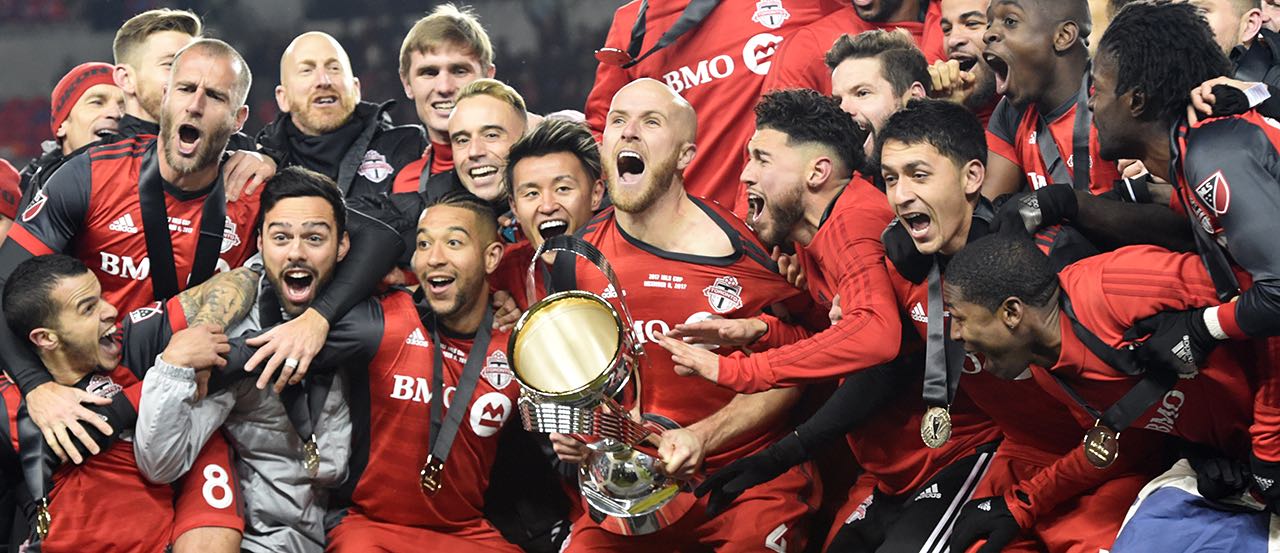By Paul Nicholson
December 11 – Toronto FC have created their own piece of history becoming the first Canadian team to win the MLS Cup and the first team to win the treble of domestic honours. The final also gave the opportunity for the United 2026 World Cup bid of Canada, Mexico and the US to promise a 2026 finals that will be bigger, better and more.
Toronto’s 2-0 win over the Seattle Sounders was accomplished in some style at their BMO Stadium in Toronto with goals from Jozy Altidore and Victor Vazquez, and an imperious midfield performance by US national team captain Michael Bradley.
It was not only the first MLS Cup win for the Canadian team that joined the league in 2007, but the only the second MLS title of any sort for the, now, three Canadian teams in the US top flight.
The first title was won earlier this season by Toronto, the Supporters’ Shield (won by the team that tops the table at the end of the regular season), to which they added a Canadian Championship title.
It was also a good weekend for the finals broadcaster ESPN who saw ratings rise by 75% against the last final they televised in 2015 final, the highest since 2012, when David Beckham and the LA Galaxy beat Houstin Dynamo.
Off the pitch was equally grandstanding with the United 2026 bid team putting forward a powerful case for their hosting of the 2026 finals, the first in the expanded 48-team format.
Central to their argument was that their bid provided bigger stadia than previous world cups, that did not require new infrastructure to be built, and that this was a diverse bid sending a positive message in a time when international relations generally are fragmenting.
“We’ve got everything in place between the three countries in terms of infrastructure: hotels, stadiums, transportation – in a way that no other region of the world could do it, especially for an expanded World Cup,” said bid chairman, FIFA Council member and US Soccer president Sunil Gulati, “… this isn’t going to be a computer-generated program that spits out an answer of what the best bid is. So we’ve got to campaign.
“We’ve always had a very special relationship with these two federations,” he added, “so they’ve been partners for a long time, and the countries have been partners.… So the message that hopefully this sends about relationships and international issues is extraordinarily important.”
Potentially the most compelling argument for FIFA will be the economic stability that 2026 will bring to FIFA after World Cups in Russia next year (which will not deliver significant new sponsors or broadcast revenue), and the some doubts over the commercial upside of Qatar in 2022.
A North American World Cup would come without any of those concerns. Gulati referenced the current sponsorship sales struggle at FIFA and the likelihood of increased broadcast revenue if 2026 was hosted in North America.
“We believe that between the size of the stadiums, which obviously impacts attendance, the level of hospitality available at stadiums, which affects revenue, and the commercial opportunities that are available to FIFA, this will be by far the most successful financial World Cup,” he said. “And it’s probably a pretty good time for that to happen for FIFA.
“The sponsorship problem at FIFA, which has been written about, is primarily the shortfall right now in regional sponsorship. That would be a big hit, obviously, in these three countries, with a population of half a billion and with the wealth of the countries. That will certainly be an important part – and it is a part of the scorecard FIFA looks at.”
There is no doubt that for FIFA’s current executive this would provide huge financial relief and the ability to complete on the doubtless multiple promises its president will be making to federations in terms of financial assistance. Promises that are not being fulfilled by the current regime which has moved the goalposts on assistance grants and held money back as reserves have dwindled and income streams dried up.
But whether the 200+ voters see the bigger, better, more picture in quite the same way remains to be seen. While FIFA’s federations have a history of voting for causes and promises, often slavishly, that most benefit their personal pockets (often literally), the United 2026 bid could still find itself facing a significant geo-political rival in the form of Morocco and a vote that potentially mirrors political rather than football alignments.
Contact the writer of this story at moc.l1751326650labto1751326650ofdlr1751326650owedi1751326650sni@n1751326650osloh1751326650cin.l1751326650uap1751326650

